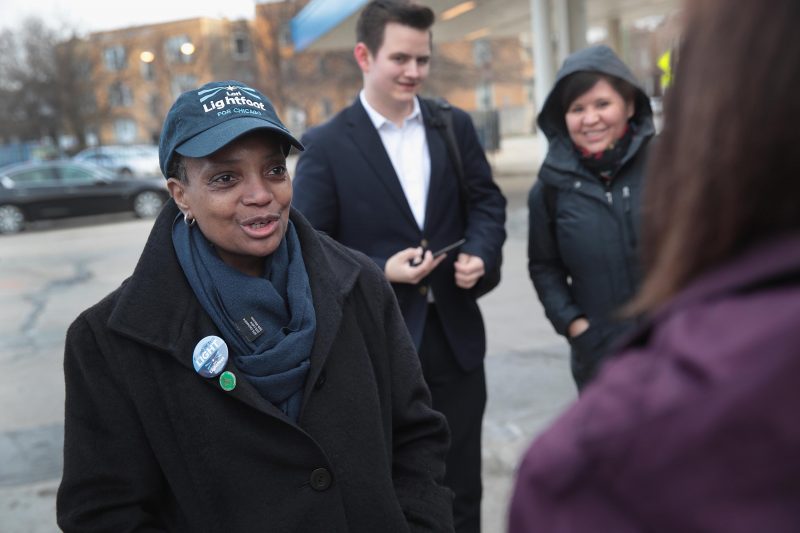Chicago to elect first black female mayor
Lori Lightfoot, in a run-off election for mayor of Chicago with Toni Preckwinkle, greets commuters on election day
(SCOTT OLSON)
Chicago (AFP) – Chicago residents went to the polls Tuesday to elect the US city’s first black female mayor — and potentially its first openly gay mayor — in a historic vote centered on issues of economic equality, race and gun violence.
Lori Lightfoot and Toni Preckwinkle, both African-American women, are competing for the top elected post in the city — the former casting herself as an outsider and reformer, and the latter as an experienced, steady hand.
The election is an inflection point in America’s third largest city. Since 1837, Chicago has chosen only one other black mayor and one other female mayor. If Lightfoot wins, she would also become the city’s first openly gay chief executive.
Analysts said voters were looking to shake up city politics — fed up with gun violence that claims more lives here than in other major American cities, and years of political corruption in the Democratic stronghold.
“This is one of the most significant elections in Chicago history,” Evan McKenzie, political science professor at the University of Illinois in Chicago, told AFP.
“Chicago voters seem to be in a ‘throw the bums out’ frame of mind,” he said.
The initial field consisted of 14 contenders, but most moderates and establishment figures were sidelined in a February vote.
The two highest vote-getters are competing in Tuesday’s run-off election and are running as progressive reformers, promising to clean up city government and reduce economic inequality.
While the two are alike in many ways, they have sought to differentiate themselves with their backgrounds.
Lightfoot has never held elected office. She is a former federal prosecutor who headed a panel investigating the city’s policing problems.
Preckwinkle is currently the chief executive of Cook County in which Chicago is located, and has held elected office in the city for decades.
Local media reported that Lightfoot appeared to have more support in pre-election polling.
“It’s change versus the status quo,” Lightfoot said at a recent debate.
– ‘New ideas’ –
Voters have left little doubt they want the eventual victor to tackle the major issues vexing the city of 2.7 million people.
“The message is that (voters) want new ideas and cleaner government,” McKenzie said.
Community groups have for years complained about disparities in living conditions among the sprawling city’s diverse communities.
Gun violence, fueled by gangs and the drug trade, plagues economically-depressed neighborhoods in the South and West, which are majority African-American.
The downtown business district, and areas to the North and along the city’s famed lake shore, have enjoyed an economic boom even as more than 550 people were murdered last year alone.
Reforming the police department, which has a sordid history of abusive tactics, and city hall, which currently is mired in a federal corruption probe of one of its members, are also top of mind, McKenzie said.
“(Voters) are tired of corruption, federal investigations of city officials, police misconduct, and a budget crisis,” he said.
– The Laquan McDonald case –
The two candidates are vying to replace outgoing mayor Rahm Emanuel — once a rising star in the Democratic Party and former President Barack Obama’s first White House chief of staff.
Emanuel sustained political damage for his handling of the Laquan McDonald case and declined to run for a third term.
McDonald was a 17-year-old black teenager shot dead by police in a 2014 encounter caught on police dash cam video.
The video — showing officer Jason Van Dyke firing 16 bullets into the knife-wielding teen even after he fell to the ground — was not released for more than a year.
Emanuel faced accusations of an attempted cover-up. He fired the police chief and brought in a reformer who has instituted changes, worked to rebuild public trust, and reduced gun violence.
But as Van Dyke was about to go on trial for murder in September, Emanuel announced he would not run for re-election.
Van Dyke was convicted and sentenced to nearly seven years in prison.
Disclaimer: Validity of the above story is for 7 Days from original date of publishing. Source: AFP.


